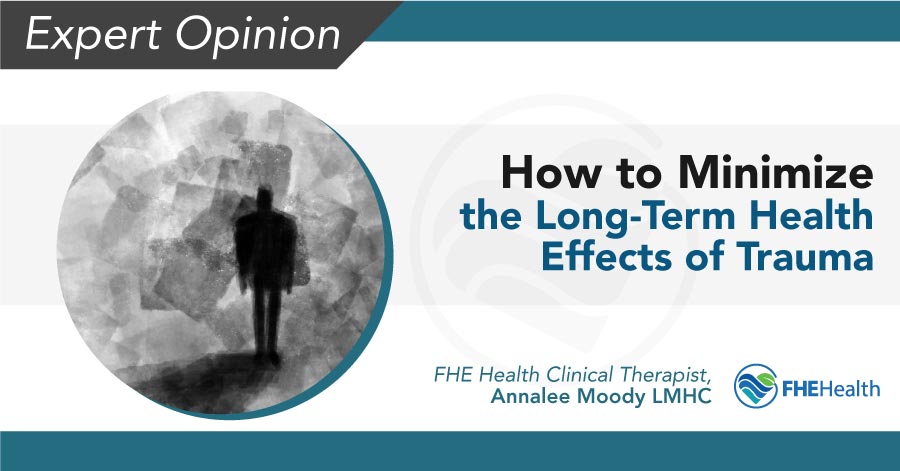
This article has been reviewed for accuracy by our peer review team which includes clinicians and medical professionals. Learn more about our peer review process.
“Most people experience a traumatic event at some point in their lives,” according to the National Center for PTSD at the U.S. Department of Veterans Affairs, but do they know that the long-term health effects of trauma can be serious and far-ranging? As an illustration, studies have found a link between exposure to trauma and a host of mental and physical conditions, including chronic lung and heart diseases, viral hepatitis, autoimmune diseases, and depression and PTSD (post-traumatic stress disorder).
While traumatic experiences typically can’t be prevented, their long-lasting impact on health can be mitigated and even avoided. The million-dollar question is “How.” If it’s possible to minimize the effects of trauma in the immediate aftermath of the experience, how do you do that?
For help with this and other related questions, we turned to one of our resident trauma experts, Annalee Moody. Moody is a clinical therapist (LMHC) with specialized training in treating trauma and works with first responders in Shatterproof FHE Health. She is also a certified first responder counselor with advanced training in EMDR (“Eye Movement Desensitization and Reprocessing”) therapy. EMDR is a highly effective, evidence-based treatment and early intervention for cumulative traumatic stress in emergency responders and veterans.
Coping with Trauma and Common Long-Term Effects?
When coping with trauma, what are some of the common long-term effects that a person should be mindful of? Moody said these can “be difficult to pin down because they can vary greatly from person to person … The shortest answer I can give is that untreated trauma can cause significant physical and psychological impairment and debilitation.”
“One significant variable in determining long-term effects,” according to Moody? “Getting treated.”
Healthy Way to Cope with Distress That Reduces Trauma’s Effects in Short Term?
Almost by definition, a traumatic event can cause distress. Especially in the short term, it’s normal to experience mental and/or physical reactions to the event. Sadness, exhaustion, confusion, anxiety, numbness, and physical arousal are frequent initial responses.
What recommendation does Moody have for a healthy way to cope during this initial period right after a traumatic event?
“Seeing a therapist as soon as possible following a traumatic incident is the best way to minimize effects, start getting treated, and begin to heal,” Moody said. “In the immediate aftermath following a traumatic incident, a therapist is going to help the individual to focus on meeting their basic needs (such as sleeping, eating, bathing, and gathering positive and helpful supports).”
Advice for How Not to Cope with Trauma?
What are some common missed opportunities right after trauma? Moody offered the following insights, which could just as well be advice for how not to cope with trauma:
Initially, after a traumatic incident, many individuals may not seek assistance until their symptoms or issues have persisted or increased to the point of being near-intolerable.
The best recommendation is to seek early treatment following a traumatic incident/exposure.
Tips for Coping After a Traumatic Event in the Long Term
A central theme that emerges from talking with Moody about coping with a traumatic event in the long term is the importance of treatment—and specifically, EMDR therapy, the “most recommended trauma treatment.” The beauty of EMDR therapy is that it “can be started right away.” (In fact, “delaying treatment has the potential to prolong trauma effects and course of treatment.”)
“The best way to look at it” is like this: Early intervention for trauma may mean long-term treatment is not even necessary.
Issues That Can Complicate Trauma Recovery
Another aspect of effective coping in the long run, according to Moody, is knowing what issues can complicate recovery. Moody cited a number of these complicating factors:
- Not having access to treatment
- The experience of multiple types of trauma in a short period of time (which “can compound effects”)
- The lack of a “helpful and positive support system”
- Judging oneself via “self-blame or shame” for responses to the trauma
- Life circumstances that “threaten basic needs being met, which can impede trauma treatment in various ways” (example: the loss of a home after the experience of a tornado)
Supportive Coping Strategies for Trauma
Do not underestimate what the love and support of family and friends can do for someone suffering from the effects of trauma. Moody suggested some ways to show support:
- Be a non-judgmental presence
- Offer support to help meet their basic needs as you are able (such as offering to take their dog for walks or providing meals)
- Don’t have expectations for what the individual may or may not be feeling
With respect to this last point, Moody said that “allowing and accepting whatever [the individual] feels about their experience can be extremely helpful.”
Of course, nobody wants to experience trauma, yet traumatic events are part of life. The key is to be proactive and seek treatment early, before more serious health effects set in. For more information about EMDR therapy and other trauma treatments, or to learn about our specialized program for first responders, contact FHE Health today.






